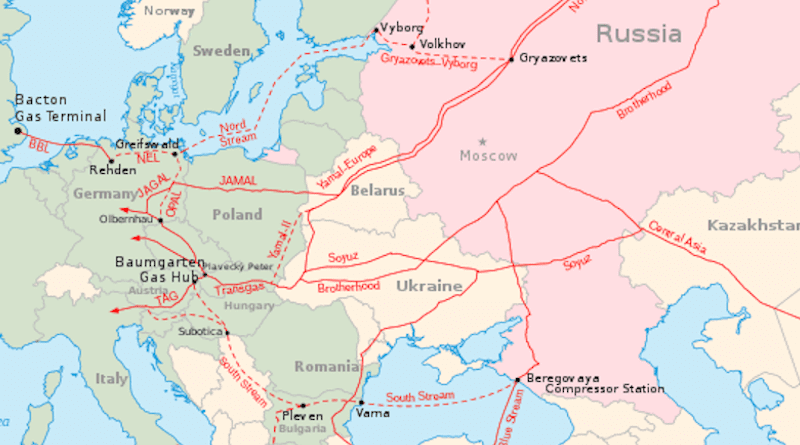Geo-Economic Contours Of Russian-Ukraine War – OpEd
The Russo-Ukraine conflict is seen as an event driven by geopolitics; however, geo-economic logic is a more decisive factor. The geo-economic significance of Ukraine is making it a buffer zone of influence between NATO and Russia. The ongoing geo-economic conflict and intertwined geopolitical interests of NATO and Russia in Ukraine have a long history. Ukraine has been the central point of the US-Russia post–Cold War interaction due to its geo-economic importance. Hence, this article looked at the Russo-Ukraine war through the prism of geo-economics.
According to Mackinder’s Geopolitical Theory of Heartland, Ukraine is a part of the heartland with large reserves of natural resources. The significant amount of critical resources in Ukraine is an essential driving factor of the conflict because the logic of economic interest is what primarily determines the foreign relations. According to the National Atlas of Ukraine, Ukrainian resources of rare minerals are unique and largest in Europe.” Lithium, titanium, and other critical minerals deposits are increasing the geo-economic position of Ukraine. The Russia, China, and Turkey were the largest importing states of titanium from Ukraine in 2021, respectively. Australia’s European Lithium continues securing rights to the Kirovograd and Donetsk region of lithium deposits in Ukraine.
Ukrainian President Volodymyr Zelensky said, “The Russian invasion came when Ukraine’s critical mineral industry was trying to develop into a major player in the clean energy transition.” It means that a country with reserves of natural resources and critical minerals invites investments and geopolitical tensions. The head of state geological service of Ukraine, Roman Opimakh, said: “Ukraine is beginning to auction the permit for exploration of its lithium reserves and other critical minerals, which can enhance the strategic importance of Ukraine on the global stage.” Moreover, Ukraine has around 400 million barrels of proven oil reserves and the second-largest natural gas reserves in the West. The natural resources and critical minerals are perceived as a concealed factor of the Ukraine war, reflecting Russia and Europeans geo-economic objectives.
The growing interest of global powers towards Ukraine is based on its geo-economic strength. Ukraine is a crucial player in the energy security of the international powers, including Russia and the West. NATO is focused on Ukraine to keep up its presence and influence in the region and block the Russian assertiveness as per the geo-economic and geostrategic plan driven by the US-led Western allies. In contrast, Ukraine is a crucial transit route for Russia to reach the global market. In this context, Russia and Ukraine signed various agreements. For instance, both countries signed a transit agreement in 2019 to transfer Russian gas to Europe via the largest gas transportation system in Ukraine.
The Bratstvo gas pipeline originates from Russia and passes through Ukraine, and then splits into various directions in Europe. The second gas pipeline from Russia passes via Ukraine to the Balkan states and Turkey. The Soyuz gas pipeline passes via Ukraine and supplies Slovakia, Romania, and Hungry. However, Russia has been facing the risk from NATO for its energy security in Ukraine due to growing the influential role of NATO in Ukraine. Likewise, this region plays a vital role for the energy security of Europe as well because its link with the resources of the Black and Caspian Seas.
Indeed, the geographical position of Ukraine presents an optimum picture from a geo-economic perspective. Ukraine can play a significant role as a trade corridor for great powers. In this regard, the global powers seek to control Ukraine for their imperial pursuits. It has access to the Black Sea via the Odesa port and is a junction point for the European Peninsula and Russia. Ukraine could be a suitable market for raw materials, cheap labor, and profitable investments for the Western bloc. However, Russia has its primary reliance on Ukraine to transport its commodities worldwide. That’s why; Russia and Europe seeks to control Ukraine at any cost due to their geo-economic objectives.
Ukraine retains its industrial potential in various sectors such as aerospace, shipbuilding, steelmaking, manufacturing of defense equipment, and many critical minerals, reflecting the geo-economic significance of Ukraine. Hence the reason why Russia and the US-led Western allies are ready to go to great lengths to determine its orientation. Suppose the US and West intend to blockade of Russian gas pipeline. In that case, they will pay a considerable cost because establishing a new energy supply line will take around ten years with an investment of multi-billion dollars. However, given the current situation, such a plan is far too difficult to put into motion and execute without the risk of escalation of conflict beyond Ukraine’s borders.
It is difficult to predict every facet of the geo-economic contours of the Russo-Ukraine war. However, the macro-level geo-economic implications will be detrimental to the Russian and European economies. Under these circumstances, energy supply disruption in the European region, will cause the hike in energy prices and may trigger an energy crisis across the globe. Considering the geo-economic status of Ukraine is much valuable regarding its geo-political position, geostrategic importance, critical resources, industrial potentials, and significant role in energy security for the NATO and Russia.
*Dr. Iqtidar Hussain (PhD in International Politics) is an Associate Director of Strategic Vision Institute (SVI)

